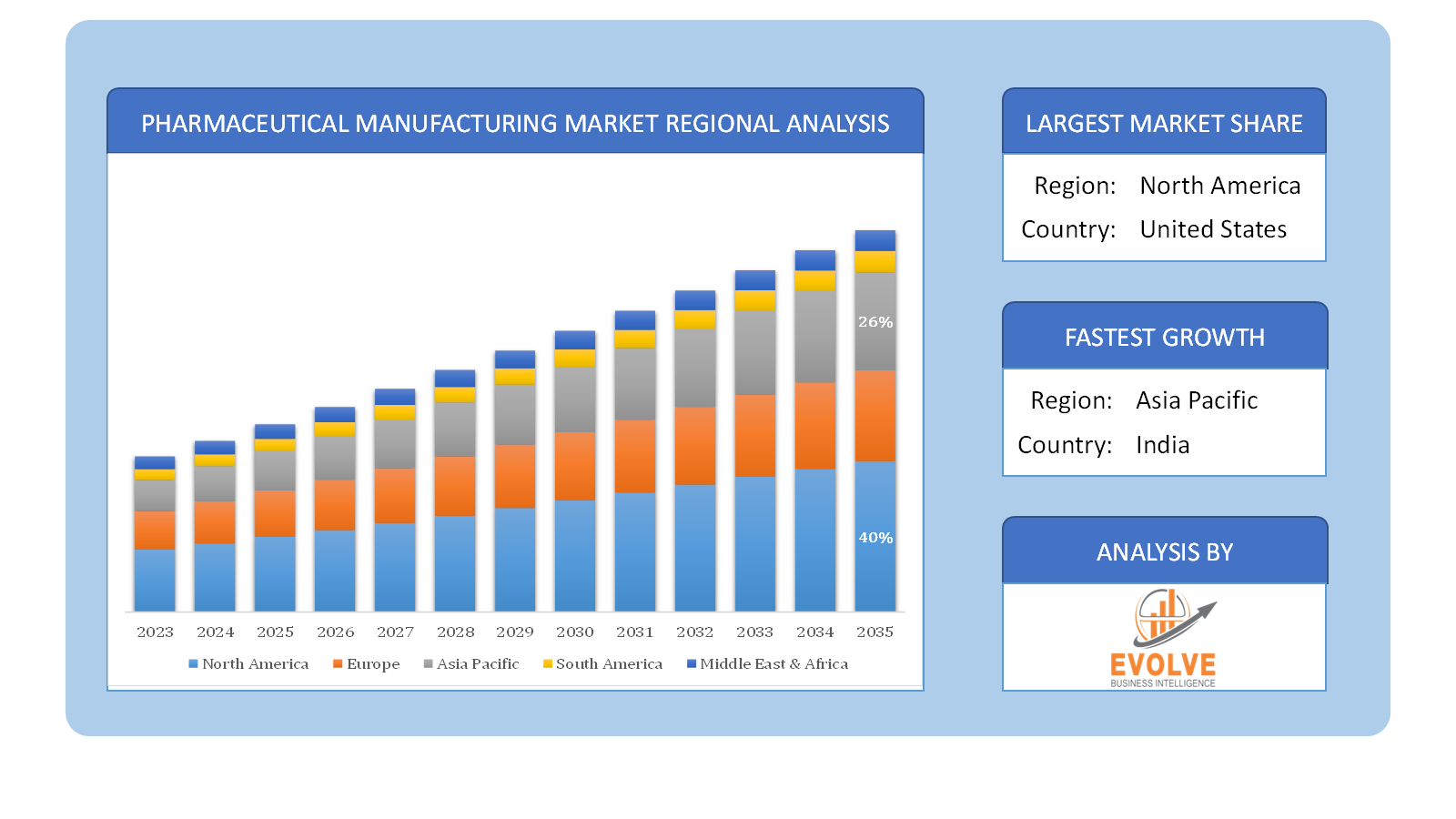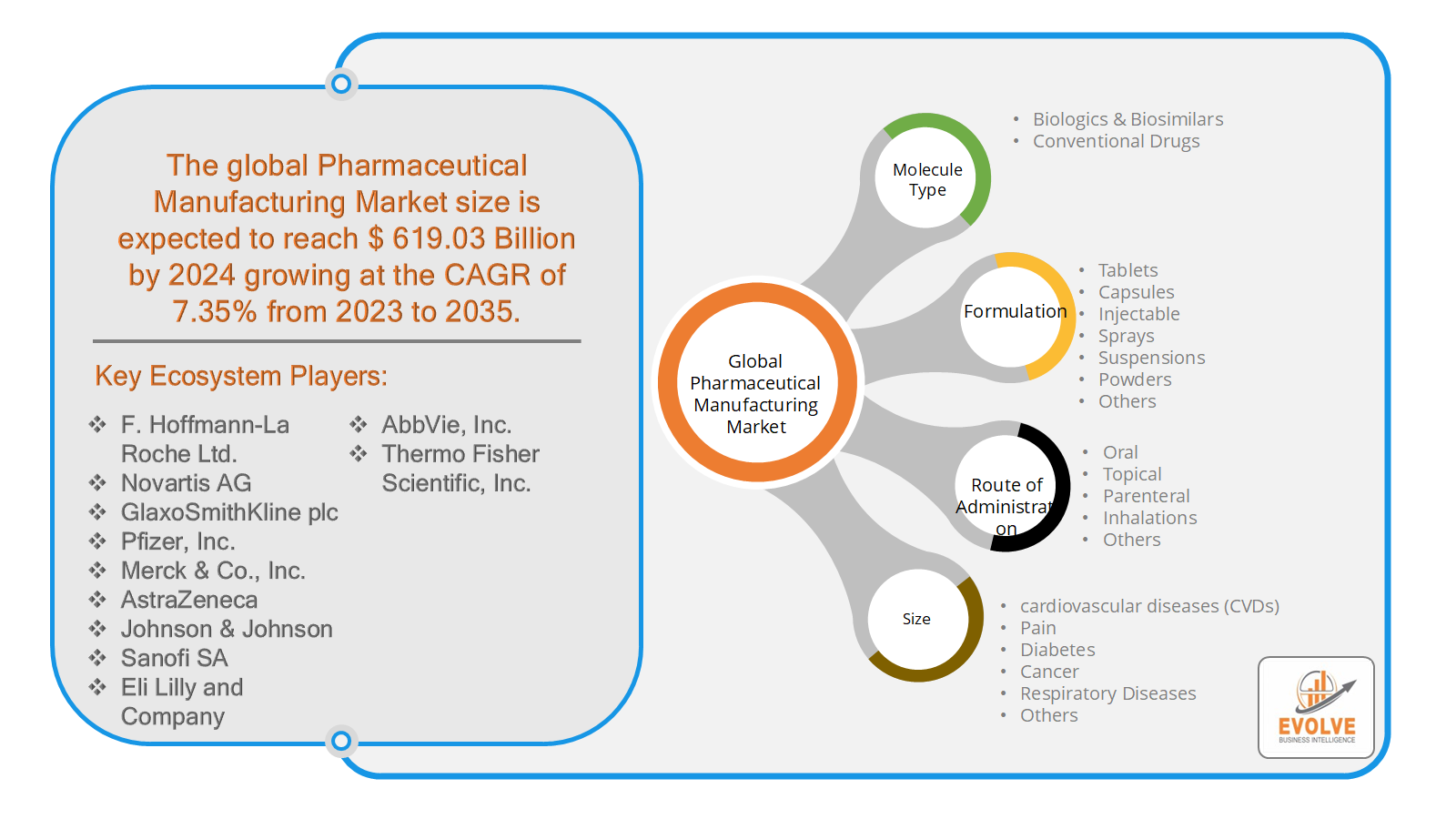The global pharmaceutical manufacturing industry is experiencing unprecedented growth, with new market research revealing significant expansion opportunities through 2035. According to recent analysis by Evolve Business Intelligence, the pharmaceutical manufacturing market is positioned for substantial growth, driven by technological advancements, increasing healthcare demands, and innovative treatment developments.
Market Size and Growth Projections
The Global Pharmaceutical Manufacturing Market is projected to reach USD 1,379.59 billion by 2035, demonstrating a robust compound annual growth rate (CAGR) of 7.35% during the forecast period from 2024 to 2035. This substantial growth reflects the industry’s critical role in global healthcare delivery and the increasing demand for both prescription and over-the-counter medications.
Key Market Players Driving Innovation
The pharmaceutical manufacturing landscape is dominated by industry giants who continue to shape market dynamics through research, development, and strategic investments:
-
F. Hoffmann-La Roche Ltd.
-
Novartis AG
-
GlaxoSmithKline plc
-
Pfizer Inc.
-
Merck & Co. Inc.
-
AstraZeneca
-
Johnson & Johnson
-
Sanofi SA
-
Eli Lilly and Company
-
Thermo Fisher Scientific Inc.
These companies represent the forefront of pharmaceutical innovation, leveraging advanced manufacturing processes including chemical synthesis, fermentation, and biotechnological methods.
Market Segmentation Analysis
By Molecule Type
The market is segmented into two primary categories:
-
Conventional Drugs (anticipated to dominate the market)
-
Biologics & Biosimilars
By Formulation
Pharmaceutical formulations are categorized as:
-
Tablets (expected market leader)
-
Capsules
-
Injectable
-
Sprays
-
Suspensions
-
Powders
-
Others
By Route of Administration
-
Oral (projected to maintain market dominance)
-
Topical
-
Parenteral
-
Inhalations
-
Others
By Therapy Area
-
Respiratory Diseases (anticipated to lead the market)
-
Cardiovascular Diseases (CVDs)
-
Pain Management
-
Diabetes
-
Cancer Treatment
-
Others
Regional Market Dynamics
North America: Innovation Hub
North America continues to lead the pharmaceutical manufacturing sector, characterized by:
-
Strong R&D investments
-
Well-established regulatory frameworks
-
Presence of major global pharmaceutical companies
-
The United States maintaining the largest market share
-
Canada contributing through favorable government policies
Europe: Established Excellence
The European market demonstrates:
-
Highly regulated industry standards
-
Strong research capabilities
-
Robust healthcare infrastructure
-
Key pharmaceutical hubs in Germany, Switzerland, and the United Kingdom
Asia-Pacific: Rapid Growth Engine
The Asia-Pacific region shows exceptional growth potential:
-
China and India emerging as global manufacturing hubs
-
Cost-effective production capabilities
-
Skilled workforce availability
-
Strong generic drug industries
-
Japan focusing on high-quality innovation and biopharmaceuticals
Emerging Markets
South America and Middle East & Africa regions are experiencing steady growth through:
-
Increasing healthcare demand
-
Government initiatives for improved drug accessibility
-
Expanding local production capabilities
-
Reduced dependency on imports
Market Growth Drivers
The pharmaceutical manufacturing industry’s expansion is fueled by several key factors:
-
Increasing Healthcare Needs: Growing global population and aging demographics
-
Technological Advancements: Innovation in manufacturing processes and drug development
-
Focus on Innovative Treatments: Development of personalized and precision medicines
-
Regulatory Support: Streamlined approval processes and supportive policies
-
Investment in R&D: Continuous funding for breakthrough therapies
Future Outlook
The pharmaceutical manufacturing market presents numerous opportunities across various segments and regions. The industry continues to evolve with:
-
Advanced manufacturing technologies
-
Sustainable production methods
-
Digital transformation initiatives
-
Enhanced supply chain optimization
-
Focus on specialty and orphan drugs
This comprehensive market analysis indicates a robust future for pharmaceutical manufacturing, with significant opportunities for both established players and new entrants to capitalize on the growing global healthcare demands.

